In case you missed it,
in our coaching tip two weeks ago, we announced that we are donating $2,500 to your favorite charitable organizations! We still have room for more! Please hurry over to that coaching tip and provide your recommendation in the comments.
Thank you again for your stories, support, encouragement and inspiration this year!
Now, onto this week’s coaching tip…
My name is Krista, and I am addicted to… REAL food!
Okay, okay, addiction probably isn’t the right word to use, but let’s just say that I have a strong passion for REAL food and life just isn’t the same without it.
Actually, addiction is a real thing when it comes to food. The University of Michigan conducted a study a few years ago and released a list of the most addicting foods. Any guesses?
 Here are the top 9!
Here are the top 9!
1 – Pizza
2 – Chocolate
3 – Potato Chips
4 – Cookies
5 – Ice Cream
6 – French Fries
7 – Cheeseburger
8 –  Soda
Soda
9 – Cake
No big surprises here, right?!
But, addiction is a serious issue…and there is more and more evidence that food addiction is becoming more prevalent. There are even organizations like the Food Addiction Institute and Food Addicts Anonymous that have been created to help people fight these addictions. Why are we so tempted by a bowl of potato chips, plate of cookies or pan of brownies? Why don’t we have the same “gotta have it” response when we walk by a bowl of apples or a platter of sliced vegetables?
Why are some foods so addictive?
Studies have shown that certain foods have the same effects on our brains as heroine, cocaine and other addicting drugs. These foods tend to be highly processed, including those with added fats, sugars, salt or refined carbs. The problem with these foods is they hit upon the “reward centers” in our brains that overtake our “willpower.” The U of M study stated, “An unprocessed food, such as an apple, is less likely to trigger an addictive-like response than a highly processed food, such as a cookie. The finding that processing was the most predictive factor for whether a food is associated with behavioral indicators of addictive-like eating behaviors is preliminary evidence for narrowing the scope of which foods are implicated in the construct of ‘food addiction.'”
Think about smokers.
They know smoking is bad for their health and is likely to lead to cancer, but they continue to smoke. It’s easy to say, “they just don’t have enough willpower,” but it’s not that simple. The way the cigarettes and nicotine light up the reward centers in the brain is often too much for their willpower to overcome.
The same is true for high-sugar and high-fat foods!
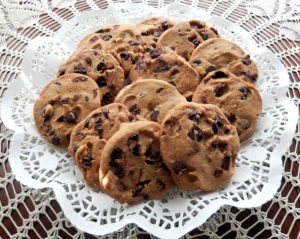 Even though we know they are not good for our health, we keep going back to them. Some people may feel like they can’t control their eating when it comes to these foods (you know, when you simply can’t walk past the cookie table without grabbing one…or more).
Even though we know they are not good for our health, we keep going back to them. Some people may feel like they can’t control their eating when it comes to these foods (you know, when you simply can’t walk past the cookie table without grabbing one…or more).
Some people may experience an inability to cut down on these foods even though they really want to (think about the diets that work short-term, but lead right back to these addicting foods). Others may feel depressed or anxious without these foods in their daily routine. This is not simply a matter of willpower…it’s a matter of overcoming the addictive characteristics of these foods.
It’s the processing!
Part of the problem with highly-processed foods is how they are absorbed in our system. Think about a coca leaf…it’s not addicting in its raw form and is actually very nutritious. However, once it is processed into cocaine (with a concentrated dose), it now becomes addictive. The same happens with highly processed foods, where the refined carbs are rapidly absorbed by our systems, causing a blood sugar spike, triggering the reward centers in our brains. Our brains tell us, “I gotta have more!” and it becomes more and more difficult to get away from these addicting foods.
So, what are we supposed to do?
Don’t worry, hope is not lost — there is a way out of this! And, you guessed it…the key is REAL food!
Zonya likes to say, “The solution to pollution is dilution!”
The more REAL food you enjoy, the less room you will have for the highly-processed, addicting foods. As you do this, your cravings will change. Please trust us on this — we have experienced it ourselves and seen it with with many others! Of course, you will still have occasional cravings for chocolate after dinner or a bowl of ice cream, but you will notice that just a few bites will satisfy you!
Here are some specific tips:
 Out of sight, out of mind. As we know, in our environment, these addictive foods are everywhere! It is important to control your environment wherever possible.
Out of sight, out of mind. As we know, in our environment, these addictive foods are everywhere! It is important to control your environment wherever possible.- Start your day with a better breakfast! Nourish your body in the morning. Don’t trigger those brain reward centers first thing in the morning…your brain will be begging for more of the addicting foods all day long!
- Plan, plan, plan! Plan your meals and snacks so you don’t have to try to rely on your willpower to avoid the highly-processed foods during the day.
- Enjoy your favorite foods…and use REAL ingredients!
How to enjoy these “most addictive foods” while keeping it REAL!
- Pizza. We all know pizza is part of our world, whether it is a get-together with friends, a church or school event, or a late night at the office. When faced with these situations, try not to make the pizza the only part of the meal. Add a side salad, or even baby carrots, grapes, or apple slices. This way, you can have one or two fewer slices of pizza and complete your meal with REAL food options. Of course, the best bet is to make a homemade pizza using a whole wheat crust (make it easy with a pre-made crust) and fresh, in-season toppings. A few great options include the Roasted Broccoli Pizza, Cherry Tomato Margherita Pizza, Thai Chicken Pizza and the Zucchini Pizza Boats.
 Chocolate. For a quick chocolate fix or after dinner sweet treat, try the Chocolate Chia Energy Bites, Dark Chocolate Drizzled Popcorn, Dark Chocolate Covered Strawberries or the Chocolate Peanut Butter Smoothie…or just enjoy a piece of your favorite dark chocolate.
Chocolate. For a quick chocolate fix or after dinner sweet treat, try the Chocolate Chia Energy Bites, Dark Chocolate Drizzled Popcorn, Dark Chocolate Covered Strawberries or the Chocolate Peanut Butter Smoothie…or just enjoy a piece of your favorite dark chocolate.
- Potato chips. Try the Salt and Vinegar Roasted Sweet Potatoes, Kale Chips or Beet Chips. Also, some store-bought chips are better than others…look for simple ingredient listings (like potatoes, avocado oil, sea salt). Yes, you can buy chips with 3 simple ingredients!
- Cookies. Try the Smarty Pants Chocolate Chip Oatmeal Cookies, Chunky Monkey Breakfast Cookies, Half Naked Almond Joy Cookie Bites or the Almond Butter Bites to satisfy a sweet craving!
 Ice cream. Try the Pina Colada Banana Ice Cream, Chocolate Banana Ice Cream, Berry and Raw Brownie Parfait, Banana Nut Butter Pudding, or the Super Pink Strawberry Raspberry Smoothie. Also, some store-bought ice creams are better than others…the one we buy includes only 4 ingredients. Just be mindful of portion sizes!
Ice cream. Try the Pina Colada Banana Ice Cream, Chocolate Banana Ice Cream, Berry and Raw Brownie Parfait, Banana Nut Butter Pudding, or the Super Pink Strawberry Raspberry Smoothie. Also, some store-bought ice creams are better than others…the one we buy includes only 4 ingredients. Just be mindful of portion sizes!
- French fries. Our son’s favorite is the Parsnip Fries and other favorites include the Sweet Potato Curly Fries, Loaded Mexican Sweet Potato Fries and the Healthi-Fried Okra.
 Cheeseburger. Using quality meat and other ingredients results in a burger that is way better (taste and health) than fast food. Try the Fajita Burger, Rosemary Swiss Burgers or the Black Bean Burgers with Egg and Sriracha Spread.
Cheeseburger. Using quality meat and other ingredients results in a burger that is way better (taste and health) than fast food. Try the Fajita Burger, Rosemary Swiss Burgers or the Black Bean Burgers with Egg and Sriracha Spread.
- Soda. It just might be the bubbly you are craving — try Healthy Soda Pop or the Red, White & Blueberry Spritzer. Your local supermarket also likely sells a sparkling water with natural flavors…this can curb your cravings for soda.
- Cake. We know, sometimes you just have to indulge! You can enjoy your favorite cake…occasionally and in moderation! Also, check out some other good options like the Apple Cinnamon Bundt Cake, Pumpkin Poppers, Black Dream Cholate Cupcakes, Chocolate Souffle, or the Baked Apples with Oatmeal Cookie Granola.
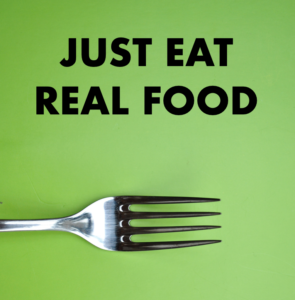 If you know someone who may be struggling with addiction to highly-processed foods, encourage them to make a change before the health consequences catch up! As always, we will continue to provide coaching tips and ideas on Eat REAL America how to conquer food addictions with REAL food alternatives!
If you know someone who may be struggling with addiction to highly-processed foods, encourage them to make a change before the health consequences catch up! As always, we will continue to provide coaching tips and ideas on Eat REAL America how to conquer food addictions with REAL food alternatives!
The key message?
Keep it simple and EAT REAL!
Source for University of Michigan Study: Which Foods May Be Addictive? The Roles of Processing, Fat Content, and Glycemic Load; Erica M. Schulte, Nicole M. Avena, Ashley N. Gearhardt; Published: February 18, 2015DOI: 10.1371/journal.pone.0117959

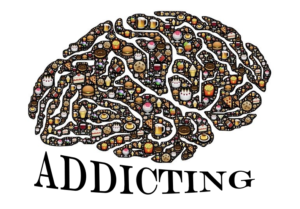
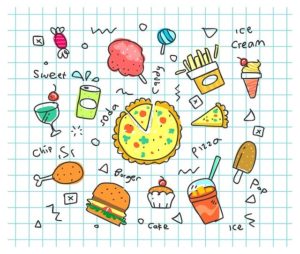
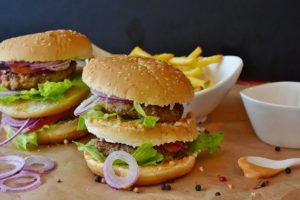
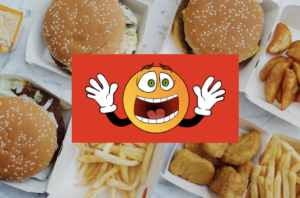
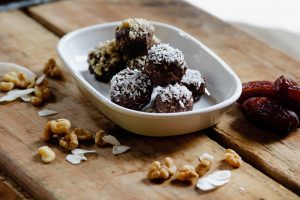
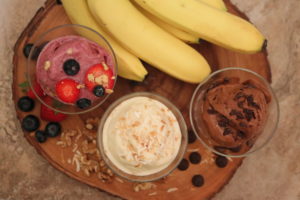
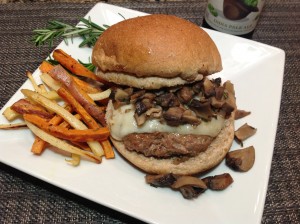
Thank you for addressing food addiction. Planning is so important to avoid turning to our old favorites during busy time- stressed days, where sometimes addiction wins over mindfulness. Thank you for all the helpful suggestions and motivation to keep trying!
This is a great tip……PLAN, PLAN, PLAN!
and it is all about the Real Food. This is the Best!!
This is VERY helpful! We’re planning a Mardi Gras party next weekend and I’ve been wracking my brain for a dessert that will fit in with both the New Orleans menu and our Eat Real plan.
So glad this helped – thank you, we appreciate your feedback!